牛津小学英语5B知识点(全)
牛津小学英语5BUnit3
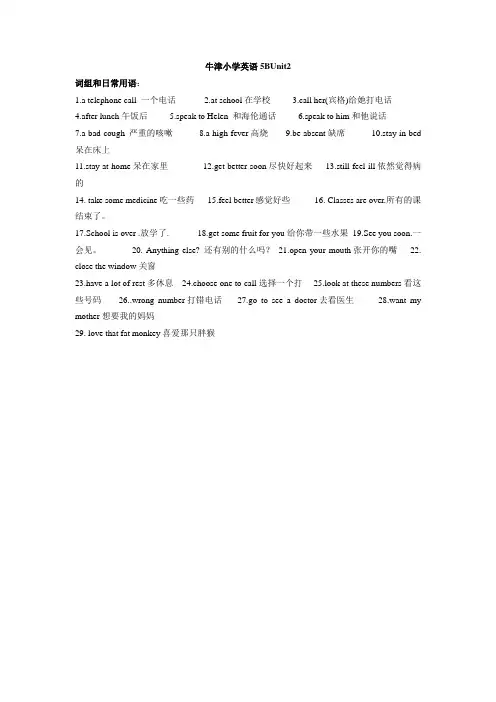
牛津小学英语5BUnit2
词组和日常用语:
1.a telephone call 一个电话
2.at school在学校
3.call her(宾格)给她打电话
4.after lunch午饭后
5.speak to Helen 和海伦通话
6.speak to him和他说话
7.a bad cough 严重的咳嗽8.a high fever高烧9.be absent缺席10.stay in bed 呆在床上
11.stay at home呆在家里12.get better soon尽快好起来13.still feel ill依然觉得病的
14. take some medicine吃一些药15.feel better感觉好些16. Classes are over.所有的课结束了。
17.School is over .放学了. 18.get some fruit for you给你带一些水果19.See you soon.一会见。
20. Anything else? 还有别的什么吗?21.open your mouth张开你的嘴22. close the window关窗
23.have a lot of rest多休息24.choose one to call选择一个打25.look at these numbers看这些号码26..wrong number打错电话 27.go to see a doctor去看医生28.want my mother想要我的妈妈
29. love that fat monkey喜爱那只胖猴。
牛津小学英语5B_期末复习资料
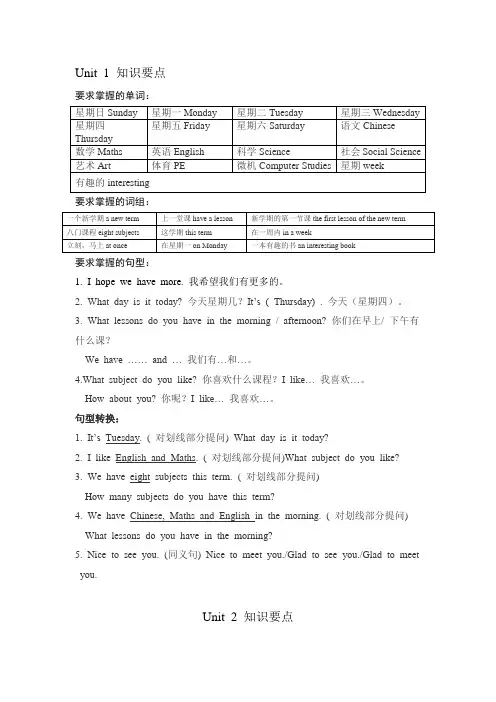
Unit 1 知识要点要求掌握的单词:要求掌握的词组:要求掌握的句型:1. I hope we have more. 我希望我们有更多的。
2. What day is it today? 今天星期几?It’s ( Thursday) . 今天(星期四)。
3. What lessons do you have in the morning / afternoon? 你们在早上/ 下午有什么课?We have …… and …我们有…和…。
4.What subject do you like? 你喜欢什么课程?I like…我喜欢…。
How about you? 你呢?I like…我喜欢…。
句型转换:1. It’s Tuesday. ( 对划线部分提问) What day is it today?2. I like English and Maths. ( 对划线部分提问)What subject do you like?3. We have eight subjects this term. ( 对划线部分提问)How many subjects do you have this term?4. We have Chinese, Maths and English in the morning. ( 对划线部分提问) What lessons do you have in the morning?5. Nice to see you. (同义句) Nice to meet you./Glad to see you./Glad to meet you.Unit 2 知识要点要求掌握的单词:要求掌握的词组:要求掌握的句型:1. Why are you absent today?你今天为什么缺席?(相当于Why are you not here today?)2. See you soon. 一会见。
牛津小学英语5BUnit6
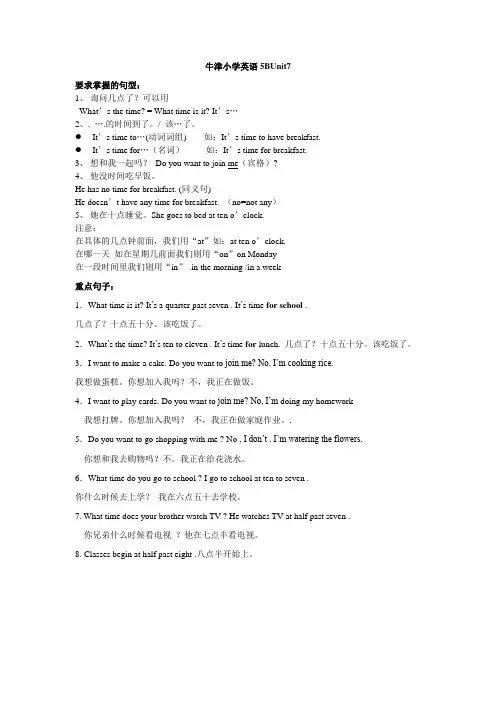
牛津小学英语5BUnit7要求掌握的句型:1、询问几点了?可以用What’s the time? = What time is it? It’s…2、. ….的时间到了。
/ 该…了。
●It’s time to…(动词词组) 如:It’s time to have breakfast.●It’s time for…(名词)如:It’s time for breakfast.3、想和我一起吗?Do you want to join me(宾格)?4、他没时间吃早饭。
He has no time for breakfast. (同义句)He doesn’t have any time for breakfast. (no=not any)5、她在十点睡觉。
She goes to bed at ten o’clock.注意:在具体的几点钟前面,我们用“at”如:at ten o’clock.在哪一天如在星期几前面我们则用“on”on Monday在一段时间里我们则用“in”in the morning /in a week重点句子:1.What time is it? It’s a quarter past seven . It’s time for school .几点了?十点五十分。
该吃饭了。
2.What’s the time? It’s ten to eleven . It’s time for lunch. 几点了?十点五十分。
该吃饭了。
3.I want to make a cake. Do you want to join me? No, I’m cooking rice.我想做蛋糕。
你想加入我吗?不,我正在做饭。
4.I want to play cards. Do you want to join me? No, I’m doing my homework我想打牌。
你想加入我吗?不,我正在做家庭作业。
牛津小学英语 5B 第一单元Part C
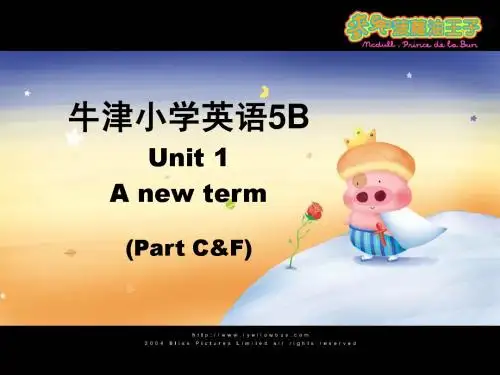
Morning
Afternoon
1.询问今天是星期几该如何问和回答呢?
What day is it today? It’s….
2.询问对方喜欢什么学科,可以这样问答
What subject do you like? I like…
3.询问对方上午或者下午有什么功课,可以问?
What lessens do you have in the morning/afternoon?
数学
语文 Morning 语文 美术 体育
Afternoon
英语
数学 语文 品社 美术 音乐
英语
数学 语文 数学 微机 美术
数学
语文 体育 科学 音乐 美术
数学
英语 语文 品社 科学 体育
音乐
My timetable
Timetable (时间表)
Monday Tuesday Wednesday Thursday Friday
--What lessons do you have in the morning? 你们早上有什么课? --We have…
afternoon 音乐
体育
A: What day is it today? B: It’s… A: What lessons do you have in the morning? B: We have…
A: What day is it today? B: It’s… A: What lessons do you have in the afternoon? B: We have…
Liu Tao’s timetable
Timetable (时间表)
Monday Tuesday Wednesday Thursdacomputer games in the class. • 4.In the class we can learn A,B,C.
牛津沪教版小学英语五年级下册知识点总结
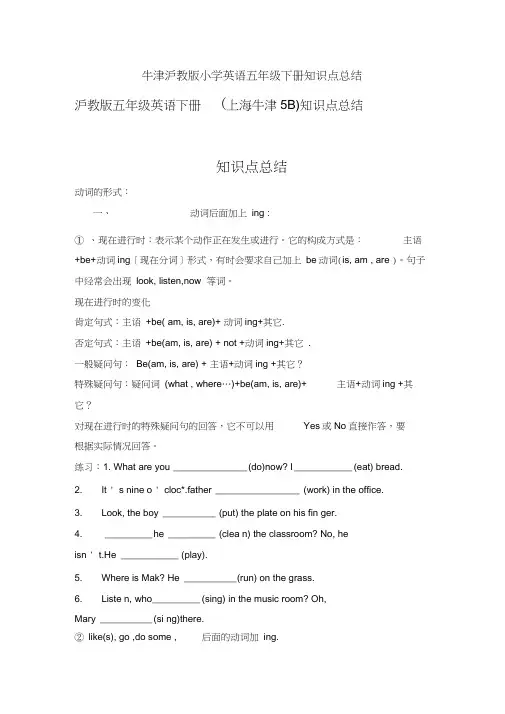
牛津沪教版小学英语五年级下册知识点总结沪教版五年级英语下册(上海牛津5B)知识点总结知识点总结动词的形式:一、动词后面加上ing :①、现在进行时:表示某个动作正在发生或进行。
它的构成方式是:主语+be+动词ing〔现在分词〕形式,有时会要求自己加上be动词(is, am , are )。
句子中经常会出现look, listen,now 等词。
现在进行时的变化肯定句式:主语+be( am, is, are)+ 动词ing+其它.否定句式:主语+be(am, is, are) + not +动词ing+其它.一般疑问句:Be(am, is, are) + 主语+动词ing +其它?特殊疑问句:疑问词(what , where…)+be(am, is, are)+ 主语+动词ing +其它?对现在进行时的特殊疑问句的回答,它不可以用Yes或No直接作答,要根据实际情况回答。
练习:1. What are you ______________ (do)now? I ___________ (eat) bread.2. It ' s nine o ' cloc*.father ________________ (work) in the office.3. Look, the boy __________ (put) the plate on his fin ger.4. _________ he _________ (clea n) the classroom? No, heisn ' t.He ___________ (play).5. Where is Mak? He __________ (run) on the grass.6. Liste n, who _________ (sing) in the music room? Oh,Mary __________ (si ng)there.②like(s), go ,do some , 后面的动词加ing.如:1.1 like (play ) football, but my father likes (play) chess.2. ____________ Let ' s go wim).二、动词后面加s/es.这就有关一种时态:一般现在时。
五年级:小学英语5B单词表(上海新教材牛津英语)
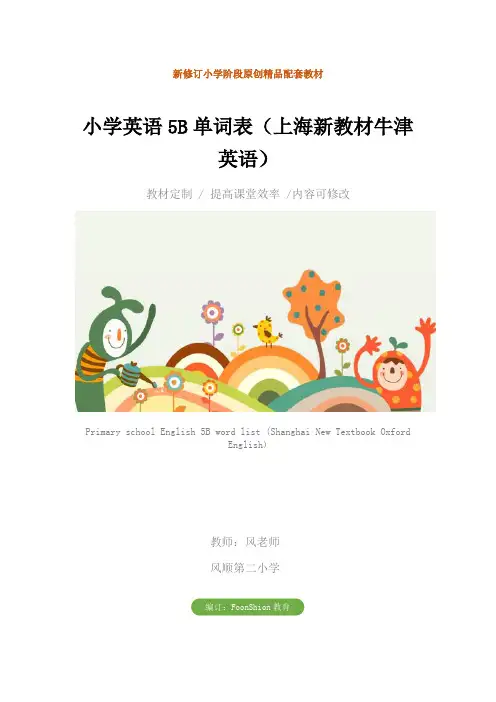
新修订小学阶段原创精品配套教材小学英语5B单词表(上海新教材牛津英语)教材定制 / 提高课堂效率 /内容可修改Primary school English 5B word list (Shanghai New Textbook OxfordEnglish)教师:风老师风顺第二小学编订:FoonShion教育小学英语5B单词表(上海新教材牛津英语)五年级第二学期牛津英语必背词汇表XX-2 班级____ 姓名____ 牛津页数中文英文中文英文p2一团糟what a mess! p12出生born名词性物主代词我的(东西)mine尾巴tail你的/你们的(东西)yours p14噪音,吵闹声nnoise他的(东西)his吵闹的adj noisy她的(东西)hers另一个another我们的(东西)ourshear的过去式heard他们的(东西)theirssit的过去式sat故事书storybook p15电钻drill p3笔记本notebook 卡车lorry画笔,毛笔brush公交车bus颜料paints小轿车car书包school bag 摩托车motorbike 蜡笔crayon电视television 胶水glue收音机胶带tape门铃doorbell放put p17流行乐队pop group p6工作坊workshop一点儿也不not at all. p7魔力的magic p18loud的最高级loudest磁铁magnet响亮的,大声的adj loud钉子响亮地,大声地adv loudly p8有趣的interesting p19安静的adjquiet昆虫insect安静地advquietly茧cocoon p20可乐cola生长grow健康的adjhealthyam/is的过去式was重要的adjimportantare的过去式weredo的过去式did p9毛毛虫caterpillar远离keep…away蝴蝶butterfly p21肉meat小鸡chick xk b1.c om 猪肉pork鸡chicken牛肉beef小鸭duckling鸡肉chicken鸭duck鱼肉fish小狗puppy水果fruit狗dog蔬菜vegetable p10蚕silkworm番茄tomato土豆potato p33到了上语文课的时间。
牛津小学英语5BUnit3Hobbies
牛津小学英语5B Unit 3 Hobbies执笔:岸头小学王慧娟一、教材简析:本单元通过Mike和Yang Ling到Ben家里作客,引出话题,谈论“爱好爱好”。
要紧学习一样疑问句Do you have any hobbies?及其答语Yes, I do. / No, I don’t. (3B Unit10/4A Unit4/5A Unit4 Do you…) 和主语为第三人称单数动词的用法(4A Unit6 She looks so Unit8 She/He has…),让学生明白明白动词在不同情形下会有形式上的转变。
本单元有9个四会辞汇,9个三会。
C、D结构板块,要紧让学生把握本单元的结构和句型,在教学进程中教师能够采纳以旧带新的方式引出句型。
学生对“爱好爱好”类单词会很感爱好。
在教学进程中教师要依照小学生的年龄特点,充分利用多媒体、实物、简笔画、图片等并加上形象化的语言和体态语,使语言点的训练紧密联系生活实际。
教学重点:能听得懂、会说、会读和会拼写一、单词:collect, a stamp, many , a ship ,go shopping , every , an aunt , an uncle;二、词组:take photos, go shopping;3、句型:Do you have any hobbies?Do you like…? Yes, I do.No, I don’t.He/She likes…教学难点:一、能正确运用Do you have any hobbies?及其答语Yes, I do. No, I don’t.He/She likes…并能在具体情境中以口笔头或书面的形式进行交流。
二、能初步明白得主语为第三人称单数时动词的转变形式。
课时建议:5课时第一课时:B部份短语make model ships,grow flowers,take photos, make clothes, collect stamps ,go shoppingC部份句型Do you have any hobbies?Yes, I do. No, I don’t.F部份:Do a survey归纳以前学过的动词短语并填表,为学生对话提供了语言信息,使学生有话可说。
昆虫单词教学 牛津小学英语5B
昆虫单词教学随笔
牛津小学英语5B
通过一段时间的练习实践,加强英语单词的有效记忆,有些难记的单词帮助学生找寻记忆的方法,学生们对于这样的记忆模式很容易接受,不仅在拼写上得到了快而有效的记忆,在读和意上面也有很好的效果,最近在教授昆虫单词时,就采用不同的记忆方法帮助学生们快速的记忆6种昆虫的拼、读、写和意。
在教学这6个词汇时,我把词汇分为2个部分,一是会飞类的——蝴蝶butterfly,蜻蜓dragonfly,萤火虫firefly,蜜蜂bee.这几种中有3种是有相同的词尾fly,蝴蝶这个单词在教授时用了拆分记忆法,but-ter-fly, 学生对于这样的记忆一目了然。
有学生还说“但是特别喜欢飞的是蝴蝶”这样记忆更加有效记忆了拼写。
蜻蜓这单词用的是音标记忆,主要是这词读音不易读准,需要加强音标认读。
萤火虫是很特别的一种,fire 是火的意思,很容易想到这是萤火虫。
还有两个单词——蚂蚁ant,蚱蜢grasshopper. 蚂蚁ant学生们一看到就自己知道怎么记忆了,他们都想到了词and,其中a的读音也是相同的。
蚱蜢grasshopper,分成了grass和hop来记忆,学生能轻松理解蚱蜢这个单词的型和意。
对于这6个单词,找到了这样的方法,学生学习起来轻松了许多。
沪教版牛津英语5BM1U1知识点
沪教版牛津英语5BM1U1知识点Unit 1: Let's Learn English1. Greetings and introductions:- Hello! Hi! How are you?- I'm fine, thank you. And you?- Nice to meet you.- What's your name? My name is...- Where are you from? I'm from...2. Classroom objects:- pencil, pen, book, ruler, eraser, pencil case, glue stick, notebook- desk, chair, blackboard, whiteboard, schoolbag3. Numbers 1-10:- one, two, three, four, five, six, seven, eight, nine, ten4. Colors:- red, blue, green, yellow, black, white, orange, purple, pink, brown5. Family members:- grandfather, grandmother, father, mother, brother, sister, baby6. Pronouns:- I, you, he, she, it, we, they7. Possessive pronouns:- my, your, his, her, its, our, their8. Animals:- dog, cat, fish, bird, rabbit, turtle, monkey, lion, elephant, giraffe, tiger9. Places:- home, school, park, supermarket, zoo, library, bank10. Prepositions of place:- in, on, under, behind, in front of, between, next to11. Verb "to be":- I am, you are, he/she/it is, we are, they are- get up, have breakfast, go to school, have lunch, do homework, go to bed- morning, afternoon, evening, night13. Days of the week:- Monday, Tuesday, Wednesday, Thursday, Friday, Saturday, Sunday14. Weather:- sunny, rainy, cloudy, windy, snowy15. Seasons:- spring, summer, autumn/fall, winter16. Clothes:- T-shirt, dress, shorts, skirt, pants, socks, shoes, hat, jacket17. Food and drinks:- apple, banana, orange, milk, water, juice, bread, rice, noodles, pizza18. Things in the kitchen:- stove, oven, refrigerator, sink, table, chair, cupboard19. Transport:- car, bus, bike, train, airplane, boat20. Sports:- tennis, soccer/football, basketball, swimming, cycling, running21. Hobbies and activities:- reading, drawing, playing music, watching TV, playing games22. Emotions:- happy, sad, angry, tired, scared, excited, bored23. Adjectives:- big, small, tall, short, long, fast, slow, beautiful, ugly, smart24. Opposites:- up/down, left/right, in/out, hot/cold, big/small,happy/sad25. Questions and responses:- What...? Where...? When...? Who...? How...?- It's... I'm... He's... She's... They're...- Listen, repeat, open your books, close your books, stand up, sit down27. Days of the week, months, and dates:- first, second, third, fourth, fifth, sixth, seventh, eighth, ninth, tenth- January, February, March, April, May, June, July, August, September, October, November, December28. Money:- yuan, dollar, euro, cent29. Musical instruments:- piano, guitar, violin, drums, flute30. Jobs:- teacher, doctor, nurse, firefighter, police officer, chef, musicianThese are the key points covered in Unit 1 of the Shanghai Oxford English 5B textbook.。
牛津小学英语B重点短语句型知识点和习题
牛津小学英语5B Unit1词组和日常用语:a new term一个新学期 have a lesson上一节课the first lesson第一节课 boys and girls 孩子们the first lesson of the new term新学期的第一节课Miss Li and her students 李老师和她的学生们Welcome back to school.欢迎回到学校.Nice to see you.见到你很高兴.on Monday在星期一in the morning在早上 on Monday morning在星期一早上have an Art lesson 上一节美术课at a Chinese lesson在语文课上eight subjects八个学科 this term 这学期what subject什么学科 an interesting story 一个有趣的故事how many lessons 多少节课 in a week在一星期里let me see让我看看 tell me 告诉我at once立刻,马上 the hot coffee热咖啡near the clock在钟的附近 for the doctor给医生like Maths very much非常喜欢数学 I’ll show you . 我会演示/证明给你看plus and minus 加和减 What’s the trick有什么窍门from Sunday to Saturday从星期日到星期六How about you 你怎么样呢重点句子:1.What day is it today It’s Tuesday.今天星期几今天星期二.2.What day is it to day It’s Friday.今天星期几今天星期五.3.What lessons do you have in the morning We have Chinese, English, Maths and Science.你们早晨上什么课我们上语文、英语、数学和科学.4.What lessons do you have on Wednesday afternoon We have English, Music and PE.星期三下午你们上什么课我们上英语,音乐和体育.5.What subject do you like I like Maths. 你喜欢什么科目我喜欢数学.6.How many days are there in a week There are seven . 一个星期有几天七天.7.How many English lessons do we have in a week We have four.我们一周上多少节英语课四节.句型转换:1. It’s Tuesday. 对划线部分提问 What day is it today2. I like English and Maths. 对划线部分提问What subject do you like3. We have eight subjects this term. 对划线部分提问How many subjects do you have this term4. We have Chinese, Maths and English in the morning. 对划线部分提问 What lessons do you have in the morning5. Nice to see you. 同义句Nice to meet you./Glad to see you./Glad to meet you.词形转换 :China形容词—Chinese here同音词—hearlesson同义词—class good反义词—badinterest形容词—interesting buy同音词—by/byeminus反义词—plus she宾格—herright同音词—write he宾格—himright反义词—wrong open反义词—close一、英汉互译1.第一节课__________________2.在晚上_____________________3.在星期一早上_______________4.一周中_____________________5.一本有趣的书_______________6.上更多的体育课______________7.at once____________________8.have an English lesson_________9.I hope_____________________10.Welcome back to school._______11.两节数学课________________12.新学期第一天________________13.every day__________________14.this afternoon_______________15.let me see_________________16.What’s the trick____________17.八门科目__________________18.What subject do you like______19.thirty minus thirteen__________20.多少节课___________________21.寻找______________________ 22.课后_______________________二、按要求写出下列单词1. do第三人称单数__________2. lesson近义词__________3. these对应词__________4. hot对应词__________5. plus近义词__________6. her主格__________7. class复数形式__________ 8. parents所有格__________9.children单数形式 __________ 10. write同音词 __________三、根据单词首字母和句子意思,将对话中的单词补充完整A: Welcome b________ to school, Ben.B: Nice to m________ you, Mr Green.A: There is a n________ subject in this t_______, do you knowB: Yes. It’s S________ S________.A: Do you l________ itB: Maybe. I t________ it will be i________.A: Of course. When do you h________ this l________ On M________ B: No. It’s on F________. W________ will teach us, Mr GreenA: Mr Zhang. He is a very good t________.四、判断下列各组单词画线部分的发音是否相同,相同的打T,不相同的打F.1.first term2.term interesting3.about how4.many table5.subject Monday6.Maths what7.Sunday but 8.Friday minus五、完成句子.1.你喜欢什么学科我喜欢语文.What _______ do you likeI like __________.2.星期二你们有什么课What _______ do you have ______ Tuesday.3.这是新学期的第一节课.This is the _______ ________ of the new term.4.放学了. 让我们弄点儿吃的.School is over. Let’s go and _______ something to _________.六、句型转换.1. It’s Monday today.对划线部分提问______ ______ is it today2. I like English and Art. 改为一般疑问句_____ you _____ English and Art3. her, are, Miss Li, a, and, lesson, having, students . 连词成句 ___________________________________________4.What lessons do you have用Tom替换you___________________________________________5.321 minus 123 is 198.对划线部分提问________________________________牛津小学英语5BUnit2词组和日常用语:1.a telephone call 一个电话2.at school在学校3.call her宾格给她打电话4.after lunch午饭后5.speak to Helen 和海伦通话6.speak to him和他说话7.a bad cough 严重的咳嗽 8.a high fever高烧 9.be absent缺席10.stay in bed呆在床上11.stay at home呆在家里 12.get better soon尽快好起来 13.stillfeel ill依然觉得病的14. take some medicine吃一些药 15.feel better感觉好些 16. Classesare over.所有的课结束了.17.School is over .放学了.18.get some fruit for you给你带一些水果 19.See you soon.一会见.20. Anything else 还有别的什么吗 21.open your mouth张开你的嘴 22.close the window关窗23.have a lot of rest多休息 24.choose one to call选择一个打 25.lookat these numbers看这些号码 26..wrong number打错电话27.go to see a doctor去看医生 28.want my mother想要我的妈妈29.love that fat monkey喜爱那只胖猴要求掌握的句型:1. Why are you absent today 你今天为什么缺席相当于Why are you not heretoday2.See you soon. 一会见.3.3. I hope you get better soon. 我希望你尽快好起来.4.4. How do you feel now 你现在觉得怎么样啊5.I feel… tired, hot, thirsty, ill…我觉得…累的,热的,渴的,病的.I can get a / some … for you. 我能给你一/ 一些….5. What’s wrong with you 你怎么了相当于What’s the matter with youI’ve got a … fever, toothache, cold, cough…我得了…发烧,牙痛,感冒,咳嗽….I’m sorry to hear that. 听到这我感到很抱歉.重点句子:1.How do you feel now I feel thirsty. I can get a glass of water for you.你现在感觉如何我感觉很渴.我可以给你一杯水.2. How do you feel now I feel tired. Sit here and have a rest ..你现在感觉如何我感觉很累.坐下休息.3.What’s wrong with you I’ve got a fever. I’m sorry to hear that.你怎么了我发烧了.很抱歉听到这个.4.What’s wrong with him He has got a toothache.他怎么了他牙疼了.5.What’s wrong with her She has got a bad cold.她怎么了她得重感冒了.6.May I speak to HelenThis is Helen speaking.我可以和海伦通话吗我是海伦.打电话的常识:如你致电某人,电话接通后,你应对接电话的人说May I speak to …, please 如果你接听电话,而你正是对方想找的人,应说Yes, speaking.如果来电的人找的人不在,你应说Sorry, …is not here.无论是你致电他人或他人致电给你,若你想问是谁在接听电话,应说Who’s that, pleaseIs that…speaking如果你想告诉对方你是谁,应说This is ….speaking.如果有人打错电话,你应说Sorry, wrong number一、翻译下列词句1打电话给我______________ 2 get better ______________3午饭后 ______________ 4 a high fever ______________5重感冒 ______________ 6 go to see a doctor ______________7呆在床上 ______________ 8 anything else ______________9对海伦说 ______________ 10 take some medicine _____________11在学校 ______________ 12 have a lot of rest _____________二、判断下列每组单词画线部分发音是否相同,用“√”或“×”表示.1. got on2.monkey doctor3.these evening4.how show5.high right6.speak breakfast7.for worker 8. cold lot 9. hope sorry三、单项选择1. --May I ________ to Yang Ling--This is Yang Ling ________.A. speak;speakB. speak;speakingC. speak;to speak2. Why ________ you absent todayA. doB. areC. is3. I hope you get ________ soon.A. bestB. goodC. better4.________some medicine and ________a lot of rest.A. Eat, takeB. Take, haveC. Take, take5. What’s wrong________ youA. withB. atC. in四、找出正确的答句.1. How are you A. This is Mike speaking.2. How do you feel now B. Yes, a lot.3. What’s wrong with you C. I’ve got a bad cough.4. May I speak to Mike D. I’m fine, thank you.5. Are you taking any medicineE. I feel ill.五、连词成句1. Su Yang, her, calls, mother, lunch, after .____________________________________2. taking, you, medicine, are, any____________________________________3. to, hear, am, sorry, I, that .____________________________________4. a, get, I, glass, water, of, you, for, can .____________________________________六、用下面所给的词填空.For, in, of, at, about, to, on, with1. I’m sorry hear that.2. What’s wrong you3. I can get some apples her.4. We have an English lesson Monday morning.5. ---Is Nancy ---No, she’s home.6. This is the first day the new term.7. It’s three thirty.七、根据所给汉语完成下列句子,每空填一词.1. 苏海生病了,她得了重感冒.Su Hai is . She has a .2. 你现在感觉怎样do you now3. 我希望你不久就好起来.I you .4. 服一些药,好好休息.some and have a .八、根据上下文完成对话.A: Hello, may I to Su YangB: I’m afraid you can’t. She is . She a fever.A: I’m sorry that. Is she medicine.B: Yes, a lot. She is a now .A: I’ll see tomorrow.B: Thank you.A: It’s my .牛津小学英语5BUnit3词组和日常用语:1.take photos拍照2.go shopping去购物3.collect stamps集邮4.make model ships做模型船5.make clothes做衣服6.grow flowers种花7.draw pictures画画8.make model planes做模型飞机9.read newspapers看报纸 10.read magazines看杂志 11.make cakes做蛋糕 12.cook nice food做美味的食物 13.wash clothes 洗衣服 14.do housework做家务 15.fly a kite放风筝 16.listen to music听音乐17.water the flowers浇花 18.play football踢足球 19.play cards打牌 20.play chess下棋 21.watch TV看电视 22.play computer games 玩电脑游戏 23.have many hobbies有许多爱好 24.many beautiful stamps许多漂亮的邮票25.show them to his classmates把它们给他的同学看26.show us his stamps 给我们看他的邮票 27.Chinese stamps中国邮票28.animal stamps动物邮票 29.Here they are .它们在这儿 30.write music 写音乐31.make pretty dresses for my doll 给我的洋娃娃做漂亮的连衣裙32.the same hobby相同的爱好e a computer使用电脑e chopsticks使用筷子要求掌握的句型:1、关于业余爱好,我们可以问:Do you have any hobbies你有些爱好吗Yes, I do. I like … taking photos 是的,我有.我喜欢...拍照No, I don’t. 不,我不喜欢.可以拓展为:Does Ben have any hobbies Yes , he does . He likes collecting Chinese stamps .本有爱好吗是的.他喜欢收集中国邮票.Does your uncle have the same hobby Yes, he does.你叔叔有同样的爱好吗是的.Does she like going shopping No, she doesn’t她喜欢购物吗不,她不喜欢.2、也可以问:What’s your hobbyI like growing flowers . Me , too .你的爱好是什么我喜欢种花.我也是.What’s your grandmother’s hobby She likes making clothes .你祖母的爱好是什么他喜欢做衣服.3、叙述某人的爱好,我们可以说:He / She likes … going shopping .他 / 她喜欢...去购物.He / She doesn’t like… growing flowers .他 / 她不喜欢...种花重点句子:1.Do you have any hobbies Yes, I do . I like taking photos. 你有爱好吗是的,我有.我喜欢拍照.2.Does Ben have any hobbies Yes , he does . He likes collecting Chinese stamps .本有爱好吗是的.他喜欢收集中国邮票.3.What’s your hobbyI like growing flowers . Me , too .你的爱好是什么我喜欢种花.我也是. 4.What’s your grandmother’s hobby She likes making clothes .你祖母的爱好是什么他喜欢做衣服.5.Does your uncle have the same hobby Yes, he does..你叔叔有同样的爱好吗是的.6.Does she like going shopping No, she doesn’t她喜欢购物吗不,她不喜欢.7.Do you water the flowers every day Sometimes I do . Sometimes I don’t .你每天浇花吗有时我浇.有时不浇.8.My brother doesn’t like watching TV.我哥哥不喜欢看电视.句型转换:He likes going shopping. 改为一般疑问句,并作否定回答Does he like going shoppingNo, he doesn’tBen likes collecting stamps. 改为否定句Ben doesn’t like collecting stamps.Helen and I like making pretty dresses. 对划线部分提问What do Helen and you likeMy father’s hobby is keeping goldfish. 改为一般疑问句Is your father’s hobby keeping goldfish知识点:一般现在时主要由动词原形表示,但第三人称单数后的动词词尾有所变化.第三人称单数动词词尾的变化有几种形式:1、一般情况加-s reads, says, takes2、以ch, sh, s, x, 或o结尾的词加-es teaches, washes, goes, watches以辅音字母加y结尾的词变y为i再加-es studies, cries, carries一.按要求写单词.1.beautiful同义词 __________2.family复数 _______________3.take现在分词 _____________4.grow第三人称单数________5aunt同音词 ______________ 6e反义词 _____________7.he物主代词 ______________ 8.dress复数 ____________9.Mike名词所有格 __________10.these单数 ________________二.词组互译1.拍照_________________ 2.每天______________3.收集邮票____________4.做衣服____________________5.在花园里_______________6.cook nice food________________7. animal stamps__________ 8.grow beautiful flowers_________9. the same hobby__________ 10.his classmates_______________三.、单项选择1. Show ______ his stamps, please. A. me B. my C. I2. My sister ______ collecting stamps. A. like B. likesC. liking3. His hobby is ______ football. A. playing B. playC. plays4.Do you have ______ Yes, I do.A. some hobbies B. any hobbiesC. any hobbys5. ______ your uncle have the same hobby Yes, he ______.A. Do, doesB. Does, doesC. Is, is四、用所给词的适当形式填空.1.My aunt _____like_____grow beautiful flowers.2. Can you _____takea photo for____I Sure.3. Do you ____watch TV every day4. They are all______listento music in the sitting-room.5. Liu Tao _____have many beautiful_____stamp.6. He________draw a picture in his classroom now.7. My father_____ read newspapers after supper every day.五、找出正确的答句.1. What are you doing there A. Yes, I do.2. Do you have any hobbiesB. I’m watering the flowers.3. What’s your hobbyC. She can make clothes.4. What can your sister do D. I like collecting stamps.六、句型转换.1. David likes playing basketball. 改为否定句David ______ _______ playing basketball.2.Show us his stamps.改为同义句Show_____ _____ to ______.3.Do you water the flowers every day用now替换every day_____________ __4. Does your uncle have any models 改为陈述句_____________ __七、连词成句.1. you, skirt, for, my, can, a, make, pretty, sister_______________________________________2. them, he, classmates, showing, is, to, his .__________________________________________八、完成句子.1.-----你妈妈在哪 ------她在花园浇花.------_______ is your mother------She’s ________ the flowers in the garden.2.她的爸爸是医生.他的爱好是看报.Her father is a doctor. ______ hobby is ______ newspapers.3.------李老师有什么爱好吗 ------有.她喜欢弹钢琴.------_______ Miss Li _______ any hobbies------Yes. She _______ ________ the piano.4.你能为我的洋娃娃做顶帽子吗____you make a hat _____my doll6.看那个女孩在仔细地画一只老虎.Look That girl______, ____ ______ _____ a tiger carefully.牛津小学英语5BUnit4词组和日常用语:动副词组类似语法speak loudly 大声地讲话 laugh loudly / cry loudly / sing loudly /run fast 跑得快 read fast /jump high 跳得高 fly high / climb high /sit quietly 安静地坐着 sleep quietly / read the book quietly dance beautifully跳舞跳的优美 sing beautifully /walk carefully 小心地走 write carefully/listen carefully swim well 游泳游得好 study well / play wellan English friend一位英国朋友 write an e-mail写一封电子邮件 his English friend他的英国朋友in the computer room在电脑房里 want to play table tennis 想要打乒乓 under the tree在树下play table tennis with Wang Bing 和王冰打乒乓 write to me 写信给我a letter for me 一封给我的信 write an e-mail to my English friend写一封电子邮件给我的朋友 study Chinese学习语文surf the internet浏览网页 live in London 住在伦敦 from Monday to Friday从星期一到星期五live in a small town near London住在伦敦附近的一个小镇里 in the sea 在大海里 on the beach 在海滩上 every day 每一天 every week 每一周do exercise 做锻炼 from my Uncle Lee来自我的李叔叔要求掌握的句型:I’m busy.我忙的.We’re the same age. 我们是同龄人.A: Does he / she jump high 他 / 她跳得高吗B: Yes, he / she does.是的,他 / 她是.No, he / she doesn’t. 不,他 / 她不是.A: What does he / she usually do on Sundays 他通常在星期日做什么B: He / She usually takes photos.他通常拍照.A: What subjects does he study at school 在学校他学什么课程B: He studies English, Maths, Science and Art. 他学英语、数学、科学和艺术.重点句子:1.Does Mike jump high Yes, he does. 麦克跳得高吗是的,他跳得高.2.Does Nancy run fast No, she doesn’t. 南希跑得快吗不,她跑得不快.3.What does Mike usually do on Sundays He usually takes photos. 他通常星期日做什么他通常拍照.4.What does LiuTao usually do in the evening He usually waters flowers.刘涛通常晚上做什么他通常浇花.5. What does Su Yang usually do after school She usually reads science magazines .苏洋通常放学后干什么她通常读科学杂志.6. What subjects does he study at school He studies English ,Maths , Science and Art .他在校学习什么科目他学英语,数学,科学和美术.7.What does she usually do on SaturdayShe usually goes shopping and does housework . She’s very busy .星期六她通常干什么她通常购物,做家务.她很忙.8.My mother washes clothes in the evening.我妈妈在晚上洗衣服.9.How does your father go to work He usually goes to work by bus .你父亲通常怎么去上班他一般乘公交车去.句型转换:1. Helen usually goes shopping on Saturdays. 对划线部分提问What does Helen usually do on Saturdays2. Does he jump high改为陈述句He jumps high.3. He runs fast. 改为否定句He doesn’t run fast.知识点:1. 在一般现在时中,行为动词与he, she, it等第三人称单数的搭配时须在行为动词后加s或es,我们来看例句:-He likes English very much. 他非常喜欢英语.2. 将句子变为一般疑问句时要借助于助动词does来帮忙,此时行为动词要用动词原形,如:-Does he like English very much 他很喜欢英语吗-Yes, he does. 是的,他很喜欢.3. 第三人称单数的特殊疑问句是在一般疑问句的基础上,再于句首加上特殊疑问词, 如:-What subject does her brother like 他哥哥喜欢什么科目-He likes Chinese. 他喜欢语文.一、英汉互译1写一封电子邮件______________ 2 surf the Internet _____________3住在一个小镇 ______________ 4 a letter for me _____________5学习语文 ______________ 6 speak loudly _____________7跑得快 ______________ 8 sit quietly ______________9跳得高 ______________ 10 dance beautifully______________二、找出正确的答句.1. What can she do A. Sorry, I can't.I'm busy.2. Let's go and play football. B. No, I'm not.3. Does David write carefullyC. She usually reads books.4. Are you surfing the Internet D. Yes, he does.5. What does she usually do E. She can play the piano.三、连词成句.1. at, studies, Lucy, school, English .____________________________________________________2. does, the, do, what, your, evening, in, mother____________________________________________________3. live, Helen, does, where____________________________________________________4. dance, beautifully, Kate , does____________________________________________________四、单项选择.1. What does his sister usually do __________ SundayA. onB. inC. at2. Gao Shan __________ to play table tennis with me.A.wantB. wantsC. going3. --Are you __________ the Internet--No, I'm not.A. surfB. surfsC. surfing4. I go to school __________ Monday __________ Friday.A. on...andB. from...toC. at...at5. -- What does Ben usually do after school-- He usually __________ after school.A. plays footballB. read magazinesC. playing table tennis五、按要求改写句子1.I speak loudly.改为否定句:改为一般疑问句:用Mike改写: _____________________________________________2. Nancy dances beautifully.改为否定句:改为一般疑问句: ___________________________________________用The girls改写: __________________ ______________3. I usually do my homework after school.提问:4. My father usually goes to work from Monday to Friday.提问:1. He ________ to school from ________ to ________.2. He usually ________ ________ in the evenings from Monday to Friday.3. He ________ the violin on ________ mornings and ________ ________ onSaturday afternoons.4. What does he do on Sunday morningsHe ________ ________ ________ stories.5. When什么时候 does he usually go to the supermarketHe ________ ________ ________ the supermarket on ________ ________. 6. When does he usually watch TV and ________ ________ musicHe ________ ________ TV on ________ ________ and ________ ________ music on ________ ________.七、根据单词首字母和句子意思,将短文中的单词补充完整.5分Jack is my good f________. He is f America. He likes p________ basketball and t________ photos. We have the s________ h________. He c________ to China to s________ Chinese. His father w________ in Beijing. They l in a big h .They both like China.牛津小学英语5BUnit6词组和日常用语:at a PE lesson在一节体育课上 give orders 发命令try to…试着做某事follow the orders跟随命令 stand in a line站成一排 do some exercise做些锻炼 put your feet together双脚并拢put your knees together双膝并拢 jump up and down上下跳 listencarefully仔细地听turn left 向左转 turn right向右转 turn left and right 左右转put …on…把…放在…上touch… with…用…触摸… do this ten times这样做十次lie on one’sback仰躺 lie on his back他仰躺 lift up your left leg提起你的左腿lift up your arms抬起你的双臂stand up起立 feel tired感觉累的 touch the flowers with her mouth用她的嘴触摸花move your legs to the left把你的腿移向左边 move them to the right 把它们移向右边move the table here把桌子移到这儿 put the plate on his finger把盘子放在他的手指上stand on the man’s shoulders站在那个男人的肩上复sit on the woman’s knee坐在那个女人的膝盖上单 want to be healthy想要健康 do some exercise with me和我做些锻炼要求掌握的句型:1.站成一排. Stand in a line.2.让我们做一些运动. Let’s do some exercise.3.现在请仔细地听. Now, listen carefully.4.上下跳. Jump up and down.5.做这个……次. Do this … times. Do this ten times.6.把……放在……上面. Put… on… Put the pineapple on your head.7.用……触摸……多少次 touch…with……times Touch your left leg with your right hand three times.重点句子:1.Put your hands on your head. All right.把你的双手放在你的头上.好的.2.Put this rubber on your nose. OK.把这橡皮放在你的鼻子上.好的.3.Can you put this big grape on your mouthYes , I can .你能把这个大葡萄放在你的嘴上吗是的,我会.4.Touch your left leg with your right hand.OK.用你的右手摸你的左腿.好的.5.Touch your right shoulder with your left hand.用你的左手摸你的右肩.6.Touch your toes with your fingers three times .用你的手指触摸你的脚趾三次.7.Turn left and right seven times . 左右转体七次.8.Lie on your back and lift up your legs eight times .仰躺,抬起你的双腿八次.9.The boy has two small eyes and a big mouth .这个男孩有双大眼睛和一张大嘴10.It has two heads , two necks , four arms , eight fingers and six legs .它有两个头,两个脖子,四条手臂,八个手指和六条腿.一、按要求写单词.1. foot 复数 _____________2. careful 副词 _____________3. left 反义词 ______________4. up 反义词 _______________5. child 复数 _______________6. right 同音词 _____________7. do 第三人称单数 _________ 8. let’s 完全形式 ____________9. give 现在分词 ___________二、英汉互译.1两次 ______________ 2 give orders ______________ 3向左转 ______________ 4 stand in a line ______________ 5你的右腿 ______________ 6 touch with ______________ 7上一节体育课 ______________ 8 lie on one's back______________ 9上下跳 ______________ 10 lift up ______________ 11do some exercise _____________ 12 put...on....______________三、判断下列单词的发音是否相同,用T F表示.1.waiter waitress2.day play3.time lift4.knee week5.take stamp6.photo model7.Sunday but 8.Friday minus四、选择合适的答句.1. Are you tired A. Yes, she does.2. Does she like taking photos B. She likes taking photos.3. Put your book on your head. C. All right.4. What does she like doing D. This is Miss Li speaking.5. May I speak to Miss Li E.Yes, we are.五、选择填空.1. We like ____________ same colour.A. aB. anC. theD. /2. Kate ______ blue eyes. Her hair _______ brown.A. have isB. have areC. has isD. has are3. Many boys in our class like _________ very much.A. play basketballB. playing basketballC. play the basketballD. playing the basketball4. What ______ Helen’s family usually doA. does B is C. are D. do5. Put your hands _______ your head and turn ______ left and right.A. on /B. up /C. on toD. / to6. Touch your eyes with your fingers _____________A. ten timesB. ten timeC. for ten timesD. at ten times六、按要求改写句子.1. Put your feet together. 改为否定句__________ put your _________ together.2. The boy is standing on the man’s shoulders. 改为一般疑问句_________ the boy ________ on the man’s _________3. They have five lessons every day. 对画线部分提问_________ __________ lessons _______ they have every day4. Can you put this pineapple on your head 否定回答_______, I _________.5. touch three toes with times your fingers your 连词成句______________________________________________________七、根据中文提示,完成下列句子.1.躺下来并举起你的双臂._______ on your _______ and _______ ________ your arms.2.闭上你的眼睛,用手去摸你的文具盒.Close your _________. __________ your pencil box ________ your hand.3. 站成一排,双脚并拢.__________ in a _______. Put your ___________ together.牛津小学英语5BUnit7Unit 7 知识要点词组和日常用语:1.没有时间休息 have no time for rest2.没有时间吃早饭have no time for breakfast3.起床 get up4. 准备be ready for5.准备吃早饭 be readyfor breakfast 6.准备吃午餐 be ready for lunch 7.去学校 go to school 8.洗脸 wash one’s face 9.刷牙 brush one’s teeth 10.值日 on duty11.观看足球比赛 watch a football game 12.看电视 watch TV 13.真的很热 be really hot 14. 确实忙be really busy 15.开始上课classes begin 16.快点 be quick 17.随身带些面包 take some bread withme 18.让我们快点 Let’s hurry 19.还没有 not yet 20.在夜间 atnight 21.该是做某事的时候了 it’s time for sth/ it’s time to do sth 22.几点what time is it/2.what’s the time3.23.在四点一刻 at a quarter past four 24.六点五十 ten to seven 25.十二点四十五 a quarter to one 26.十一点一刻 a quarter past eleven27.三点半 half past three 28.在六点半at half past six 29.十二点差一刻 a quarter to twelve 30.太迟了it’s late 31.忙碌的一天 a busyday 32.吃早饭have breakfast 33.吃午饭have lunch 34.吃晚饭havesupper 35.吃正餐have dinner 36.回家come home go home 37.去睡觉go to bed 38.需要打扫图书馆need to clean the library 39做家庭作业do one’s homework 40.想要看电视 want to watch TV 41. 骑自行车ride a bike 42.骑马 ride a horse 43.放风筝fly a kite44.洗衣服wash clothes 45.步行 on foot 46.在星星公园at StarPark 47.打排球play volleyball 48.打乒乓play table tennis 49.去参加聚会go to the party 50.加入我的行列join me 51.看钟look at theclock 52.从早上七点到晚上十点from seven in the morning to ten at night要求掌握的句型:1、询问几点了可以用What’s the time = What time is it It’s…2、. ….的时间到了./ 该…了.It’s time to…动词词组如:It’s time to have breakfast.It’s time for…名词如:It’s time for breakfast.3、想和我一起吗 Do you want to join me宾格4、5、他没时间吃早饭.He has no time for breakfast. 同义句He doesn’t have any time for breakfast. no=not any6、她在十点睡觉.She goes to bed at ten o’clock.注意:在具体的几点钟前面,我们用“at”如:at ten o’clock.在哪一天如在星期几前面我们则用“on”on Monday在一段时间里我们则用“in” in the morning /in a week重点句子:1.What time is it It’s a quarter past seven . It’s time for school . 几点了十点五十分.该吃饭了.2.What’s the timeIt’s ten to eleven . It’s time for lunch. 几点了十点五十分.该吃饭了. 3.I want to make a cake. Do you want to join meNo, I’m coo king rice.我想做蛋糕.你想加入我吗不,我正在做饭.4.I want to play cards. Do you want to join meNo, I’m doing my homework我想打牌.你想加入我吗不,我正在做家庭作业..5.Do you want to go shopping with me No , I don’t . I’m watering the flowers.你想和我去购物吗不.我正在给花浇水.6.What time do you go to school I go to school at ten to seven .你什么时候去上学我在六点五十去学校.7. What time does your brother watch TV He watches TV at half past seven .你兄弟什么时候看电视他在七点半看电视.8.Classes begin at half past eight .八点半开始上.一、按要求写单词.1. tooth 复数____________2. doesn’t完全形式_________3. me 主格 ____________4. wash第三人称单数_______5. go 反义词_____________6. sit现在分词___________7. good 副词 ____________ 8. quickly形容词__________9. hear 同音词___________二、英汉互译.1.值日 _________________2.刷牙 _________________3.在夜里 _______________4.看电视 _______________5.吃午饭 _______________6.a busy day __________________7.be quick __________________8.a football game _______________9.do homework _______________10.not yet ________________三、用所给介词的适当形式填空.with for past to in at from … to … on1.She comes home at five _________ the evening.2.I’m taking some bread _________ me to school3.Now it’s time _________ supper.4.— Is it time __________ play the piano now — Yes, it is.5.I go to school __________ Monday ________ Friday.6.Now it’s half __________ eleven. We are listening to music at home.7.We usually go climbing __________ Sunday and do our homework __________ the weekends.四、单词辩音A B C D1.clock doctor box go2.park car start quarter3.teacher her order finger4.ready breakfast really head5puter subject bus lunch五、选择题.1.What your parents wantA. doB. doesC. are2. Miss Li is______. She has no time ______rest.A. tired... forB. happy...ofC. busy... to3. There's no time _______breakfast.A. forB. toC. in4. It's eight o'clock. Helen is ______her homework.A. doB. doingC. Does5. Sam _____to bed at nine every evening.A. goB. goingC. goes6. There's a football game______ a quarter to four.A.atB. pastC. About7.Are you ready lunch, David____ yet, Mum.A. to, NoB. for, isn'tC. for, Not六、按要求完成下列句子,每空一词1. There is some water in the glass. 改为一般疑问句___________ there ___________ water in the glass2. I feel ill now. 对划线部分提问___________ ___________ you feel now3. He usually grows flowers on Sundays. 对划线部分提问___________ ___________ he usually do on Sundays4. I like playing chess.改为否定句I ___________ like ___________ chess.5. It’s time to have dinner.改为同义句It’s ___________ ___________ dinner.牛津小学英语5BUnit8Unit 8 知识要点词组和日常用语:at the weekends 在周末 Friday afternoon星期五下午 talk about谈论某事 talk about their weekends谈论他们的周末 talk about our hobbies谈论我们的爱好spend one’s weekends过周末 spend your weekends 度过你的周末 surf the Internet上网 very interesting非常有趣 learn a lot from it 从中学到很多 learn a lot from the books 从书上学到很多 learn from him 向他学习 every Saturday and Sunday 每星期六和星期日 like sport喜欢运动 how about…怎么样 of course当然 play on the swings荡秋千 go to the cinema去电影院 go to the park去公园 go climbing 去爬山 go swimming去游泳 go fishing 去钓鱼 go skating去溜冰 go skiing 去滑雪 watch TV at home在家看电视 watch cartoons看动画片listen to music听音乐 do housework做家务 wash the clothes 洗衣服read English 读英语 draw pictures画画 clean the rooms打扫房间sing beautifully唱歌动听 fly high飞得高 our good friends 我们的好朋友 primary school小学 study at Yu Cai Primary School在育才小学学习 like insects very much非常喜欢昆虫 a lot of insects许多昆虫other interesting insects其它有趣的昆虫 watch ants观察蚂蚁 carry big things搬运大东西 dance in the flowers在花丛中跳舞 catch butterflies捉蝴蝶 catch fireflies 捕捉萤火虫 put them in the bottles把它们放在瓶子里 glow at night在夜晚发光 sleep in the tree 在树上睡觉 Class is over下课了 School is over放学了课后 after class 放学后 after school要求掌握的句型:。
- 1、下载文档前请自行甄别文档内容的完整性,平台不提供额外的编辑、内容补充、找答案等附加服务。
- 2、"仅部分预览"的文档,不可在线预览部分如存在完整性等问题,可反馈申请退款(可完整预览的文档不适用该条件!)。
- 3、如文档侵犯您的权益,请联系客服反馈,我们会尽快为您处理(人工客服工作时间:9:00-18:30)。
一、改写单词1.单数变为复数this(these) that(those) am/is(are) photo(photos) ship(ships) garden(gardens) foot(feet) tooth(teeth) family(families) hobby(hobbies) firefly(fireflies) butterfly(butterflies) dragonfly(dragonflies) country(countries) watch(watches) class(classes) box(boxes) Chinese(Chinese) people(people) child(children) knife(knives)2.近义词many(a lot of)(lots of) usually(often)(always) quick(fast) of course(sure)3.反义词wrong(right) cold(hot) different(same) come(go) here(there) up(down) stand(sit) fine(bad) good(bad) left(right) yes(no) ill(well) plus(minus) on(under)4.同音词Uu(you) Bb(bee) Ii(eye) Cc(see)(sea) Tt(tea) two(to)(too) their(there) four(for) by(buy)know(no) write(right)5.现在分词grow(growing) visit(visiting) keep(keeping) turn(turning) play(playing) stay(staying) water(watering) touch(touching) travel(traveling) fight(fighting) collect(collecting) like(liking) take(taking) make(making) dance(dancing) have(having) write(writing) run(running) swim(swimming) jog(jogging) stop(stopping) shop(shopping) sit(sitting) put(putting) begin(beginning)6.第三人称单数形式look(looks) like(likes) run(runs) dance(dances) stay(stays) play(plays) begin(begins) have(has) watch(watches) catch(catches) touch(touches) go(goes) do(does) study(studies)7.完整形式let’s(let us) he’s(he’s) they’re(they are) don’t(do not) doesn’t(does not) I’ve(I have) can’t(can not)8.名词所有格Ben(Ben’s)Mike(Mike’s) Su Yang(Su Yang’s) Helen(Helen’s) 9.主格his(he) her(she) me(I) them(they) your(you) us(we) 10.宾格she(her) he(him) I(me) you(you) they(them) we(us) it(it)二、改写句子1.对画线部分提问It’s half past ten. (What time is it?)The students are in the sprots hall. (Where are the students?)My uncle likes growing flowers. (What does your uncle like doing?)I feel better now. (How do you feel now?)I’ve got a high fever. (What’s wrong with you?)I come from Japan. (Where do you come from?)She is from China. (Where is she from?)The girl in red is my sister. (Which girl is your sister?)Tom comes from the USA.(Who comes from the USA?)2.改为一般疑问句I’m taking some medicine. (Are you taking any medicine?)She feels very tired. (Does she feel tired?)I want to fly a kite. (Do you want to fly a kite?)The boy is standing. (Is the boy standing?)He lives in a small town. (Does he live in a small town?)They can play the piano. (Can they play the piano?)3.改为否定句My mother is taking some medicine. (My mother isn’t taking any medicine.) She can make clothes. (She can’t make clothes.)He works from Monday to Friday. (He doesn’t work from Monday to Friday.) They’re buying food in the shop. (they aren’t buying food in the shop.) They play table tennis every day. (They don’t play table tennis every day.) That is Jan’s umbrella. (改为同义句)That umbrella is Jan’s.It’s time to have breakfast. (改为同义句)It’s time for breakfast./It’s time for having breakfast.Who is absent today? (改为同义句)Who is not here today?I’m going to the library now. (改为祈使句)Don’t go to the library now.The man puts the plate on his finger. (改为现在进行时)The man is putting the plate on his finger.They are our good friends. (改为单数形式)He is my good friend.They usually do housework on Sundays. (改为单数形式)He usually does housework on Sunday.三、连词成句think, is, today, Saturday, I (.) (I think today is Saturday.) you, can, me, tell (?) (Can you tell me?)I, to, go, China, hope, I, can (.) (I hope I can go to China.) this, subject, you, do, what, like, term (?)(What subject do you like this term?)lesson, it, the, new, the, of, term, is first (.)(It is the first lesson of the new term.)is, stamps, he, showing, to, friends, his, his (.)(He is showing his stamps to his friends.)she, does, making, like, ships, model (?)(Does she like making model ships?)with, what’s, you, wrong (?) (What’s wrong with you?) have, lessons, I, in, four, the, morning (.)(I have four lessons in the morning.)goes, from, he, Friday, to, Monday, school, to (.)(He goes to school from Monday to Friday.) subjects, study, what, he, at, does, school (?)(What subjects do you study at school?)hobby, stamps, is, Ben’s, collecting (.)(Ben’s hobby is collecting stamps.)you, in, what, do, lessons, the have, morning (?)(What lessons do you have in the morning?)you, why, absent, are, today (?) (Why are you absent today?) left, right, Ton, three, turn, times, and (.)(Turn left and right three times, Tom.)you, touch, your, your, head, can, with, hands(?)(Can you touch your head with your hands?)lie, do, on, not, your, back(.)(Do not lie on your back.) putting, the, is man, on, the, apple, finger, his (.)(The man is putting the apple on his finger.)are, the, lesson, students, where, having, a PE (?) (Where are the students having a PE lesson?)fingers, many, does, how, the, have, monkey (?)(How many fingers does the monkey have?)has, a, David, day, busy (.) (David has a busy day.)a, game, basketball, this, there, evening, is (.)(There is a basketball game this evening.)what, it, is, time, now, Ben(?) (What time is it now,Ben?) you, thirsty, feel, do (?) (Do you feel thirsty?)begins, English, at, to, fifteen, our, lesson, ten (.)(Our English lesson begins at fifteen to ten.)like, Mike, does, to, English, speak (?)(Does Mike like to speak English?)same, Tom, are, Jason, From, country, the and (.) (Tom and Jason are from the same country.)are, the, Miss, talking, Wang, students, to (.)(The students are talking to Miss Wang.)want, do, New York, you, go, to, around (?)(Do you want to go around New York?)teaches, he, in, school, English, a, primary (.)(He teaches English in a primary school.)it, today, what, is day(?) (What day is it today?)is, think, interesting, I, English (.)(I think English is very interesting.)us, meet, come, and, here(.)(Come here and meet us.) an, e-mail, he, writing, is, his, teacher, to (.)(He is writing an e-mail to his teacher.)四、中译英(一)词组1 在周一上午(on Monday morning)2读英语(read English)3上一节美术课(have an Art lesson)4一节有趣的课(an interesting lesson)5上更多的课(have more lesson)6每天(every day)7马上(at once)8午饭后(after lunch)9感到很热(feel hot)10重感冒(a bad cold)11.休息(have a rest)12看医生(see a doctor)13吃一些药(take some medicine)14感到好些了(feel better)15在周三(on Wednesday)16星期四下午(Thursday afternoon)17七门科目(seven subjects)18在一周内(in a week)19对…说话(speak to…)20打电话给我(call me)21患了咳嗽(get a cough)22怎么了(what’s wrong)23在学校(at school)24呆在床上(stay in bed )25错误号码(wrong number )26拍照(take photos )27集邮(collect stamps)28一位老同学(an old classmate)29一艘轮船(a ship )30购物(go shopping)31种树(grow the trees)32听音乐(listen to music)33出示…给…(show to…)34看一看(have a look)35养金鱼(keep goldfish)36一封邮件(an e-mail)37同龄(the same age)38在一个小镇上(in a small town)39一封给我姐姐的信(a letter to my sister) 40居住(live in)41小房子(a small house)42从…到…(from…to…)43安静地坐(sit quietly)44在我家附近(near my home)45做衣服(make clothes)46上学(go to school)47放学后(after school)48做运动(do sports)49一张动物邮票(an animal stamp)50拍照(take photos)51养狗(keep dogs)52相同的爱好(the same hobby)53写歌曲(write music)54上网(surf the Internet)55足球踢得好(play football well)56快速地停(stop quickly )57在每周六(on every Saturday)58读报(read newspaper)59浇花(water flowers)60打乒乓球(play table tennis)61弹钢琴(play the piano)62照看(look after)63仔细听(listen carefully)64抬起你的右腿(lift up your right leg)65向左转十次(turn left ten times)66上下跳两次(jump up and down two times)67把他们移到教室(move them to the classroom) 68站成四排(stand in four lines)69发出命令(give orders)70把你的手放在一起(put your hands together) 71弯曲你的膝盖(bend your knees)72做一些早锻炼(do some morning exercise)73在他的背上(on his back)74在体育课上(at a PE lesson)75在体育馆里(in the sports hall)76碰你的手臂(touch your arm)77抬起(lift up)78仰躺(lie on one’s back)79做家庭作业(do one’s homework)80做家务(do housework)81刷牙(brush teeth)82洗脸(wash face)83在八点半(at half past eight)84值日(on duty )85十点三刻(a quarter to eleven)86让我们快点(let’s hurry)87忙碌的一天(a busy day)88十点十分(ten past ten)89没有时间休息(have no time for rest)90从早到晚(from morning to night)91吃一些面包(have somebread)92谈论他们的家庭(talk about their family)93当然(of course)94从书中学到很多(learn a lot from the book) 95搬运一只红色的盒子(carry a red box)96捉蚂蚁(catch ants)97去跑步(go running)98度周末(spend weekends)99团队合作(group work )100在夜间发光(glow at night)101英语俱乐部(the English club)102不同的国家(different countries)103喜欢旅游(live traveling )104一个美国男孩(an American boy)105说法语(speak French)106长城(the Great Wall)107苏州园林(the gardens in Su Zhou)108与…交谈(talk to…)109三个中国男孩(three Chinese boys)110在日本(in Japan)111儿童俱乐部(the Children’s club)112一位忙碌的参观者(a busy visitor)113访问澳大利亚(visit Australia)114一只勇敢的蚂蚁(a brave ant)115一张法国地图(a map of France)116去爬山(go climbing )117捉昆虫(catch insects)118游览中国(go around China)119试着…(try to…)120在周末(at the weekends)(二)句子1、小男孩正站在他父亲的肩膀上。
